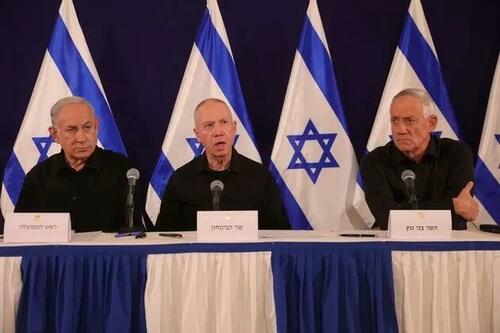Outrage After Netanyahu Blames Security, Military Chiefs Over Oct.7 Failures
Israeli Prime Minister Benjamin Netanyahu’s days are numbered in the country’s top office, according to growing consensus both inside and outside Israel. The dominant thinking is that once this conflict and crisis settles, he will pay the political price for October 7.
Fierce domestic political controversy has already erupted, fueled especially by a weekend statement (since retracted) issued by Netanyahu which laid blame on the military and intelligence establishment for failing to identify and prevent the threats that led to the Oct.7 Hamas terror raids that killed over 1,400 people and resulted in the kidnapping of over 220 men, women and children.
Netanyahu has yet to take any personal responsibility. The whole event shocked the world and especially Israeli citizens who’ve long joked that even if a cricket or small animal approached the Israel-Gaza border fence, the Israel Defense Forces (IDF) would know about it.
But instead, Netanyahu has deflected, and after a tense Saturday news conference shifted blame on his security chiefs. He posted to X: “Under no circumstances and at no stage was Prime Minister Netanyahu warned of war intentions on the part of Hamas.”
He then emphasized, “On the contrary, the assessment of the entire security echelon, including the head of military intelligence and the head of Shin Bet, was that Hamas was deterred and was seeking an arrangement.”
He soon after deleted the post the amid the firestorm of controversy that ensued, and instead stated in a new post, “I was wrong.” He apologized and backtracked:
“The things I said following the press conference should not have been said and I apologize for that,” he wrote. “I give full backing to all the heads of the security arms. I am strengthening the Chief of Staff and the commanders and soldiers of the IDF [Israel Defense Forces] who are at the front,” he wrote in Hebrew, according to a translation.
The comments split the already fragile unity of the emergency war coalition which was agreed to by opposition leader Benny Gantz, who was the first to lash out.
Netanyahu’s quick retraction is being seen in part as a necessary move toward preserving the wartime emergency government, and to pacify a media establishment which is already “out for blood” related to the hostage crisis and Oct.7, which marked the worst single-day terror attack in Israel’s history:
His statement was met with sharp criticism from several officials. Gantz, a former defense minister and current cabinet minister, called on Netanyahu to retract his comments.
Leader of the opposition and former Prime Minister Yair Lapid echoed Gantz, saying Netanyahu “crossed a red line” with his words.
Most importantly Lapid was able to play the undermining the military while the nation is at war card. He said according to a Reuters translation, “The attempts to evade responsibility and place the blame on the security establishment weakens the [Israeli Defense Forces] while it’s fighting Israel’s enemies.”
The New York Times has meanwhile written that the optics have been made worse by Netanyahu’s continued refusal to take any responsibility for failures to protect the nation, but simultaneously other senior officials have issued their own apologies and statements of deep regret:
Although many senior officials, including military and security chiefs and the defense minister, Yoav Gallant, have accepted some responsibility for Israel being caught so off-guard, Mr. Netanyahu has declined to do so. He has said several times, most recently at a news conference on Saturday evening, that after the war tough questions would be asked of everybody, including himself. Mr. Netanyahu has been in power for 14 of the past 16 years.
Mr. Netanyahu’s refusal to publicly accept blame has further shaken confidence in his leadership, which had fallen even before the war, in part because of his efforts to push through a judicial overhaul that sparked huge nationwide protests. Opinion surveys since Oct. 7 have indicated overwhelming public trust in the military and plummeting faith in government officials.
Families of Oct.7 victims, as well as loved ones of citizens still held hostage, have also been garnering media attention in their denunciations of Netanyahu’s leadership.
But what can one family, or the families of the more than 200 held by Hamas, do to secure the release of their loved ones? Israel is at war, its leaders are bent on revenge and its armed forces on the verge of an invasion that could endanger the hostages. https://t.co/WYpHC9yJei
— max seddon (@maxseddon) October 28, 2023
For these and many other Israeli families, Netanyahu’s “Mr. Security” Persona has fallen off and been exposed, as Bloomberg has written:
The aftermath marks what may be the ultimate test of Netanyahu’s political survival skills. Although Netanyahu, 74, deleted the post and issued a rare apology hours later, the calls for him to step down are becoming an ever-louder chorus. Critics are meanwhile increasingly emboldened to go as far as to question his ability to lead Israel as it wages a punishing war in Gaza.
Moshe Yaalon, his former defense minister, did so in a radio interview, saying the prime minister “is solely engaged in political maneuvering and his attitude is, ‘Let the nation burn.’ I don’t trust him to lead the military campaign.”
While this fight hasn’t been featured much in Western press, the families’ statements have driven a lot of reporting within Israel itself. They are urging a large-scale prisoner swap, given that from the start Hamas has demanded that thousands of Palestinians in Israeli prisons go free. But now that the IDF is actively operating deep inside Gaza Strip, this appears off the table in terms of a serious option Netanyahu is considering.
Tyler Durden
Mon, 10/30/2023 – 12:20
via ZeroHedge News https://ift.tt/fWbu6F3 Tyler Durden
